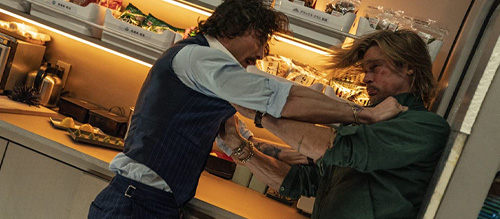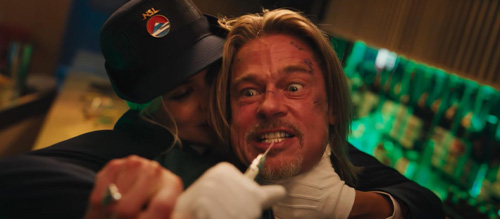Bullet Train (2022) Review
Bullet Train (2022) Review
Director: David Leitch
Screenwriters: Zak Olkewicz, Kôtarô Isaka
Starring: Brad Pitt, Joey King, Aaron Taylor-Johnson, Brian Tyree Henry, Andrew Koji, Hiroyuki Sanada, Michael Shannon
There are many baffling things in the world, and how this film cost nearly $86million (according to IMDb), is certainly one of them. It is one of the simplest premises you’ll find; in fact, Bullet Train’s actual title should have been Murderers on the Oriental Express. Brad Pitt plays Ladybug, a snatch-and-grab thief who ends up on the Bullet Train in Tokyo. Only there’s a host of assassins on the train, all there for their own reasons, mostly revolving around the same prize: a briefcase containing $10million.
The cast, to their credit, perform their socks off. And, why wouldn’t they? They’re all stellar, and they get to do cool neon-soaked fight scenes on a train, and action-y stuff with quippy dialogue. They put their heart into it; that much is for sure. And the writing tries to tie everything in together, continuously jumping back and forth through flashbacks in whip-panning, zipping, snapping editing to keep everything moving at the bullet-train pace it should, constantly trying to pull the rug out from under you.
But here’s where the fun stops…
For all the stylised camerawork, the snarky dialogue, the neon carriages, the good performances, et cetera et cetera, there’s a lot wrong with Bullet Train. And it boils down, as per usual, to two main parts: the writing and the directing.
The film’s a good 20 minutes, even 30, longer than it should be. It starts quickly enough, then takes its damn time to do anything. So much of the film is spent wandering up and down the carriages between stops at stations, trying to manufacture ways to keep our characters on the train, that it is dull in the first half of the film. Jokes that don’t land go on for way too long, the action (when it gets going), is shaky and isn’t polished enough for all its hip, cool, down-with-the-kids stylisation, and only two or three characters get more than the threadbare minimum of actual characterisation because we need more quirky funny un-funny dialogue.

The main problem is that, despite having a budget most films can only dream of (John Wick’s budget was a mere $30million for comparison to another modern action-movie with an A-list star), is that it has restraint. Something is holding it back from going all out, just tearing up the rulebook and going for insanity. There’s a crowd of assassins all trying to take each other out on a train; this isn’t the time to try and make sense or be slick. Just run with the thing. As many limbs as can be severed, do it, with as much blood as possible. As random a fight scene as you can make it, do it. Use the ridiculousness of the scenario to create the humour and madness, and not rely on dialogue which gets old very quickly. One only wonders what someone like Takashi Miike would have done with this film; probably spend a fifth of the budget maximum, and make it vastly more entertaining without as much ridiculous, annoying CGI climbing-on-the-rear-end-and-punching-your-way-into-a-speeding-bullet-train-without-so-much-as-a-bleeding-knuckle moments.
Bullet Train’s focus on style, the consistent tone and plodding pace (which keeps missing chances to end nicely and organically) means that the characters suffer. Two films which spring to mind that would make good companion pieces are 2015’s Robbery, and Diner from 2019. Both contain multiple assassins in a confined space, and with a bit of neon to boot, but manage to use the absurdity of the situation to create humour, entertainment, and, most certainly in Diner’s case, empathy and pathos. These human emotions break through any kind of stylistic beat-stick because, in the end, character always wins. Bullet Train, for all its larger-than-life personas, seems to have left its characters back in Tokyo.
Score: 11/24


